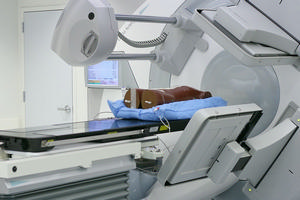Radiation Safety a Top Priority
Getting diagnosed with cancer is scary, and the treatment sometimes can seem just as intimidating as the disease. Radiation therapy is an effective cancer treatment, but many patients wonder how safe it really is, particularly since radiation is an "invisible" treatment that can't be seen or touched.
![]()
This anxiety can be heightened when patients hear or read about radiation treatments that have gone wrong. However, it is important to note that while radiation treatment is usually very safe, the medicine is complex and therefore requires vigilant safety monitoring, a well-trained staff, and open communication with patients.
At UC Davis, patients can be confident that their safety is never compromised. "Our top commitment is to provide the safest radiation treatments," stresses Dr. Richard Valicenti, Chair of the Department of Radiation Oncology.
"Our top commitment is to provide the safest radiation treatments."
— Richard Valicenti, Chair of the Department of Radiation Oncology.
Multiple layers of checks and balances ensure that the rare error is prevented whenever possible. "We have a very good safety net," explains Robin Stern, Ph.D., Chief Clinical Physicist at the Department of Radiation Oncology. "There are comprehensive quality assurance (QA) checklists in place for both treatment planning and treatment delivery that minimize the potential for errors to happen."
Radiation therapy is a complex technology that treats complex medical issues, Dr. Stern further explains. "At UC Davis, our focus is making sure that we deliver exactly what we want to deliver exactly where we want to."
Working Together to Keep It Safe

Rigorous testing of our treatment machines ensure accuracy and patient safety.
At UC Davis, a highly-trained radiation oncology team works together to deliver the best and safest therapy. Each team includes a radiation oncologist, medical physicist, dosimetrist, radiation therapist, radiation oncology nurse and clinical engineer. The team and facility adhere fully to both state and federal safety regulations, as well as additional safety/QA measures adopted by UC Davis.
Rigorous treatment-machine QA is performed daily, monthly and yearly. The team performs radiation therapy machine calibration to make sure that the correct dose is delivered to patients. Every morning, checks are made to confirm proper operation of the treatment machines. Physicists also perform thorough monthly and yearly quality assurance, which includes extensive measurements to verify and maintain accuracy.
"We have a very good safety net. There are comprehensive quality assurance checklists in place for both treatment planning and treatment delivery "
— Robin Stern, Chief Clinical Physicist
In addition, UC Davis has a large Radiation Use Committee that continuously monitors the program. Several of our medical physicists are recognized experts in quality assurance who actively participate in the development of national quality assurance programs, including those sponsored by the American Society for Radiation Oncology (ASTRO) and the American Association of Physicists in Medicine (AAPM).
UC Davis is also frequently used as a training site for inspectors and staff from the California State Radiologic Health Branch, which oversees the safe use of linear accelerators. The VA has also turned to UC Davis for brachytherapy (radioactive implant) safety training.
The More You Know, The Better
The American Society for Radiation Oncology has emphasized that it is important for radiation therapy patients to understand that the odds of beating cancer with radiation therapy are significantly greater than being harmed by a mistake. According to their calculations, radiation therapy is safe 99.99 percent of the time.
Radiation therapy is safe 99.99% of the time.
— American Society for Radiation Oncology
Open and honest communication with their doctors can help assure patients that they are in good hands, and this is particularly true for patients facing radiation treatment. Radiation therapy is a complex process and while patients are nervous, they often don't know what questions to ask. If patients are armed with the right questions, they can relieve many concerns and feel more confident in their treatment. Visit our Frequently Asked Questions section for specific questions and answers regarding radiation safety.
An excellent resource for patients undergoing radiation therapy can be found on ASTRO's website, www.rtanswers.org. Here, patients can learn more about radiation safety as well as find additional information to guide them from start to finish. Additional support can be obtained from the National Cancer Institute and the National Comprehensive Cancer Network. To contact the UC Davis Comprehensive Cancer Center, call (916) 734-5810.



